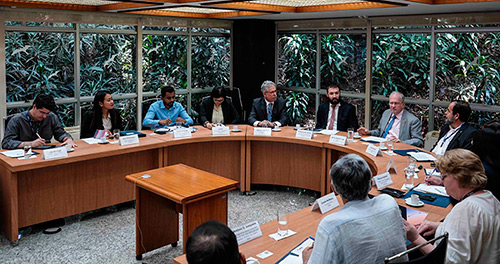


Problem-solving programs, especially in biofuels and innovation, were among the possibilities for collaboration highlighted at the meeting (photo: Agência FAPESP)
Published on 01/15/2024
By Maria Fernanda Ziegler | Agência FAPESP – Representatives of the Association of Southeast Asian Nations (ASEAN) met with senior executives of FAPESP on December 7, 2023, to discuss ways of intensifying collaboration in research and innovation.
“Brazil and the members of ASEAN are countries with several important similarities, yet enjoy scant exchange in science, technology and innovation,” said Marco Antonio Zago, President of FAPESP. The similarities include large populations, tropical climates, and dynamic economies.
ASEAN accounted for 10% of global GDP growth in 2023. According to Brazil’s Foreign Ministry, Brazilian exports to Indonesia, Malaysia, Singapore, Thailand and Vietnam total more than its exports to five of the G7 countries (France, Germany, Italy, Japan and the UK). The value of its trade with Southeast Asia has expanded from USD 2.9 billion 20 years ago to USD 34.0 billion now.
However, analysis by FAPESP shows that only about 4,000 articles written jointly by researchers from São Paulo and Southeast Asia have been published since 2010, most of them on medicine and health in general. There is also collaboration in physics and agriculture, among other fields.
The possibilities for further collaboration highlighted at the meeting included programs based on problem-solving. “Plasticity is one of FAPESP’s characteristics. Top-down programs on specific topics have multiplied recently,” said Marcio de Castro, FAPESP’s Scientific Director.
“The potential for biofuels in the emerging economies of Latin American, the Caribbean, Africa and Asia is huge. The Global South comprises regions with growing demand for sustainable energy, abundant local resources and land available for biofuel production,” said Glaucia Mendes Souza, a member of the steering committee for the FAPESP Bioenergy Research Program (BIOEN).
Souza cited the project Biofuels in Emerging Markets, an analysis of policies and mandates conducted by BIOEN in partnership with the International Energy Agency’s bioenergy task force. The categories used to classify the political and policymaking environment ranged from fully or partially implemented biofuel markets to a positive environment with a legal framework.
“We’ve collaborated with Latin American countries like Argentina, Colombia and Guatemala via this program. Our main African partnerships are with South Africa and Ethiopia. It would be well worthwhile to step up our collaboration with Southeast Asian countries,” she said.
“Our countries have problems in common, such as climate and agriculture, and they can be solved via collaboration,” said Carlos Graeff, an advisor to FAPESP’s Scientific Director.
The need to intensify innovation-oriented partnerships was another important point stressed by Paulo Schor, a member of FAPESP’s Adjunct Panel for Research and Innovation. FAPESP supports research in science and technology by micro, small and medium enterprises in São Paulo state via the Innovative Research in Small Business Program, known as PIPE, the acronym of Pesquisa Inovativa em Pequenas Empresas.
“Many startups developed with FAPESP’s support are interested in the Southeast Asian market. They have solutions to problems common to both of us, such as climate, cities, infrastructure and basic sanitation,” Schor said.
The following representatives of ASEAN took part in the meeting: Pham Quang Minh (Vietnam), Assistant Director and Head of Food, Agriculture and Forestry; Megasari Widyaty (Indonesia), Assistant Director and Head of Transportation; Dara Panhavotey, Cambodian diplomat responsible for the Brazil-ASEAN partnership; Theresa Septiani, Indonesia’s Director of External Cooperation; Mogen Selvaraja, Assistant Secretary for International Cooperation, Ministry of Foreign Affairs, Malaysia; Ignacio S. Santillana, Deputy Head of Research and Extension, Sugar Regulatory Administration (SRA), Philippines; Ei Ei Khine, Director, Economic Relations, Ministry for Foreign Investment and Economic Relations, Myanmar; and Do Thi Ngoc Thuy, ASEAN Department, Ministry of Foreign Affairs, Vietnam.
Also attending the meeting were Liz Lee, Second Secretary of the Embassy of the Republic of Singapore in Brasília; Laksanavadee Kaewkramol, a diplomat with Thailand International Cooperation Agency (TICA); Adélia Maria Moniz, Head, Partnership Department, Ministry of Health, Timor Leste; Antônio Divino Junqueira, Manager, Technical Cooperation with Africa, Asia and Oceania (CGAA), Brazilian Cooperation Agency (ABC); and Humberto Mayese Corrêa, ASEAN Liaison, Brazilian Ministry for Foreign Affairs.
Source: https://agencia.fapesp.br/50638